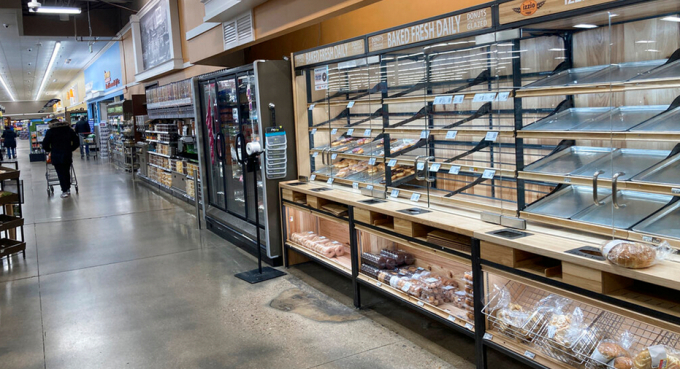June 20, 2025 | 20:31 GMT +7
June 20, 2025 | 20:31 GMT +7
Hotline: 0913.378.918
June 20, 2025 | 20:31 GMT +7
Hotline: 0913.378.918

A lone shopper pushes a cart down an empty aisle and past a lightly-stocked donut case in a King Soopers grocery store Friday, Jan. 21, 2022, in southeast Denver. Photo: FB
Rising food prices are leading American consumers to fill their shopping carts with cheaper groceries.
Shoppers are seeking more discounts and are switching to lower-cost store brands for cooking oil, frozen food and items in other grocery sections, supermarket executives said. To stretch their dollars, people increasingly are comparing prices at various stores and signing up for savings programs such as automatic delivery that give additional discounts.
The move marks a shift in consumer behavior after shoppers splurged on food earlier in the pandemic. Food companies have said that unemployment benefits and federal stimulus checks left people with extra cash and that consumers spent more on groceries as they cut back on dining out and travel in 2020. As inflation reaches its highest rate in four decades, shoppers in recent months have started looking for ways to lower their food bills, industry executives and analysts said.
"I’m getting creative with trying to save money," said Natalie Existe, a health counselor who lives in New Jersey. She said that she is buying groceries in bulk and comparing prices of multiple retailers online before going shopping in person.
Ms. Existe said she has been checking weekly circulars for bargains and cutting spending on hair and nail appointments, as overall prices of goods increase. She said she has noticed higher prices for meat, vegetables and beverages such as orange juice and cranberry juice, and now spends about $200 a trip on groceries for herself and her 12-year-old son, compared with $125 to $150 months ago.
The U.S. Labor Department’s consumer-price index, which tracks the costs of consumer goods and services, climbed 7% in December from the same month in 2020, the fastest pace since 1982. The food-at-home index rose 6.5% in 2021, the largest over-the-year increase since 2008. The index for meats, poultry, fish and eggs increased 12.5% from 2020 to 2021, while fruits, vegetables, cereal and bakery products were also more expensive.
Kroger managing inflation with select price increases
Kroger has experienced higher product cost inflation across most of its categories, including grocery and meat.
Kroger executives warned Thursday that the supermarket has had to pass some of its higher product costs onto customers in the form of price hikes. The company noted it has experienced higher product cost inflation across most of its categories, including grocery and meat.
"We are being disciplined in managing these increases. Our teams are doing an excellent job working to minimize the effects on our customers and our financial model by using our data and working closely with our suppliers," Kroger CFO Gary Millerchip told analysts on the company's earnings call. "We are passing along higher costs to the customer where it makes sense to do so. In some key areas, we are choosing not to pass through cost increases and continuing to invest in value for the customer."
Kroger emphasized that it is leveraging its proprietary data to be strategic in its pricing and personalization and offering consumers cheaper alternatives from its portfolio of Our Brands products.
The select price hikes come as Kroger beat Wall Street estimates for its fiscal third quarter, reporting total sales of $31.9 billion in the quarter, compared to $29.7 billion for the same period last year. Adjusted earnings per share came in at 78 cents, compared to 71 cents a year ago, and Kroger posted an operating profit of $868 million, up from $792 million a year ago.
In addition to inflation, Kroger continues to face ongoing supply chain issues ahead of the holiday season.
In order to address supply constraints, Kroger has kept additional warehouses added during the COVID-19 pandemic to help customers throughout the holiday season. The company has also deployed its owned and operated fleet to help alleviate supply chain pressure and has hired over 64,000 new associates during the third quarter to help fulfill demand during the holiday season.
Kroger shares are up 41% year to date.
(Fox Bussiness)

(VAN) Poultry production in Poland, which has only started recovering from devastating bird flu outbreaks earlier this year, has been hit by a series of outbreaks of Newcastle disease, with the veterinary situation deteriorating rapidly.

(VAN) Extensive licensing requirements raise concerns about intellectual property theft.

(VAN) As of Friday, a salmonella outbreak linked to a California egg producer had sickened at least 79 people. Of the infected people, 21 hospitalizations were reported, U.S. health officials said.

(VAN) With the war ongoing, many Ukrainian farmers and rural farming families face limited access to their land due to mines and lack the financial resources to purchase needed agricultural inputs.

(VAN) Vikas Rambal has quietly built a $5 billion business empire in manufacturing, property and solar, and catapulted onto the Rich List.

(VAN) Available cropland now at less than five percent, according to latest geospatial assessment from FAO and UNOSAT.

(VAN) Alt Carbon has raised $12 million in a seed round as it plans to scale its carbon dioxide removal work in the South Asian nation.